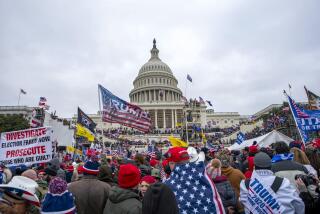Supreme Court appears unlikely to put off healthcare ruling
Reporting from Washington — The Supreme Court justices, beginning an epic debate over the Obama administration’s healthcare law, gave no sign Monday they are inclined to put off a constitutional ruling on the legislation’s mandate that all Americans have health insurance by 2014.
Instead, the justices in their comments and questions said they did not see a 19th century tax law as a legal barrier to ruling this year on challenges to the healthcare measure.
Under the Patient Protection and Affordable Care Act, those who do not have basic health insurance in 2014 must pay a penalty on their tax return to be filed in April 2015. Under the 19th century law, however, a taxpayer must pay his tax first and sue for a refund later.
But Justice Stephen G. Breyer, joining others, said he was not convinced that law stood in the way of action by the high court. Congress did not label the penalty a tax in the Affordable Care Act, he said. “It’s up to Congress, and they did not use the word ‘tax’,” he said.
Justice Antonin Scalia said he was inclined to agree, but for a different reason. The courts can usually rule directly on legal challenges unless a law makes clear that judges should hold off. “It is hard to think this clear,” Scalia said to laughter in the court.
During the 90 minutes of argument, none of the justices spoke strongly in favor of delaying a decision on the healthcare law.
Read the transcript from the opening arguments via C-SPAN
On Tuesday, the high court is scheduled to turn its attention to the crucial question: Does Congress have the power under the Constitution to require all Americans to have health insurance?
The administration defends the rule as necessary to make its insurance regulation work. Insurers were told they must offer coverage to all applicants, even if they have a “pre-existing” medical condition that would make them a costly risk. If there were no mandate to have coverage, healthy people could wait until they were diagnosed with a disease and then sign up for coverage.
Opponents of the law say the mandate is unconstitutional because Congress cannot force Americans to buy a product as a way to regulate commerce. Republican lawyers for 26 states and the National Federation of Independent Business want the full law struck down.
It was possible, and some thought likely, the court would find itself unable to decide this question because of the Anti-Injunction Act, the 19th century tax measure. But that possibility dimmed early in Monday’s argument.
Both the administration and the law’s opponents agreed that the legal challenge should go forward now. U.S. Solicitor General Donald Verrilli Jr. argued that the old law does not stand in the way of ruling now on whether it is constitutional to mandate insurance coverage. He was followed by attorney Gregory Katsas for the National Federation of Independent Business, who agreed the legal challenge can go forward.
Chief Justice John G. Roberts Jr. noted that the court in the past has “gone back and forth” over whether the 19th century law is a barrier to quick rulings on tax-related claims. But crucially, he said, the high court ruled on a historic challenge to the Social Security Act and upheld the law in 1937. It imposed taxes on workers to pay for old-age pensions. That “is very similar” to this case, he said.
On Friday, the justices are scheduled to meet behind closed doors to vote on the four separate issues to be debated this week. But by the tone of Monday’s argument, it did not sound likely that they will vote to put off a decision on the constitutional questions.
Follow Politics Now on Twitter
Original source: Supreme Court not convinced laws serve as barrier to healthcare ruling
More to Read
Get the L.A. Times Politics newsletter
Deeply reported insights into legislation, politics and policy from Sacramento, Washington and beyond. In your inbox three times per week.
You may occasionally receive promotional content from the Los Angeles Times.











